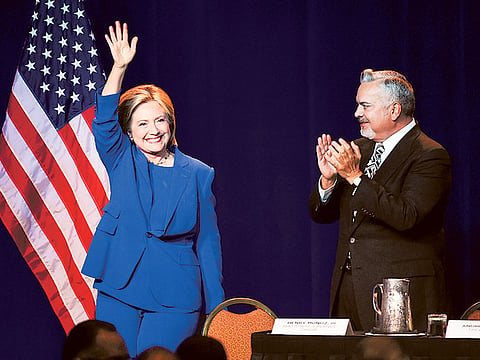Democratic challengers launch attacks against Clinton, party leadership
Clinton seeks to position herself as the undisputed Democratic standard-bearer

MINNEAPOLIS — Hillary Rodham Clinton sought to cement her standing as the rightful leader of the Democratic Party here Friday, but two of her challengers launched a fierce counterattack against her and a party establishment they see as trying to hand her the 2016 presidential nomination.
What began as a routine forum of candidate speeches evolved into a surprisingly dramatic day at the Democratic National Committee’s summer meeting, as Sen. Bernie Sanders, I-Vt., and former Maryland governor Martin O’Malley issued thinly veiled attacks on Clinton and the party leadership.
Speaking from the dais, with DNC Chairwoman Debbie Wasserman Schultz sitting a few feet away, O’Malley blasted the party’s limited number of sanctioned debates as a process “rigged” in favour of the front-runner. The DNC is holding six debates, only four before February’s first caucuses in Iowa, which O’Malley argued is a disadvantage for all the candidates and a disservice to Democrats generally.
“This sort of rigged process has never been attempted before,” said O’Malley, who has struggled to gain traction in the polls. He added: “We are the Democratic Party, not the undemocratic party.”
Sanders — who later told reporters he agreed with O’Malley — lamented low Democratic turnout in last year’s midterm elections and said the party must grow beyond “politics as usual” if it hopes to produce the level of voter enthusiasm required to retain the White House in 2016.
“We need a movement which takes on the economic and political establishment, not one which is part of that establishment,” said Sanders, who is an independent but caucuses with Democrats in the Senate.
Asked later whether he was speaking specifically about Clinton, he told reporters, “I’ll let you use your imagination on that.”
The barbs from Sanders and O’Malley came as Clinton and her campaign flexed their organizational muscle here. The front-runner and her top aides worked aggressively behind the scenes this week to secure commitments from party leaders pledging to be delegates for her in next summer’s nominating convention in Philadelphia.
Clinton’s organizational push sent a clear signal to Vice-President Biden, who has been weighing a late entry into the 2016 campaign, that he would begin far behind her.
In her address to a ballroom full of DNC members, Clinton sought to position herself as the undisputed Democratic standard-bearer. She fired up the party faithful with a call to arms against Republicans as dangerously out of touch and peppered with gibes at current GOP front-runner Donald Trump — including a suggestion that his hair, although natural, is dyed like her own.
“The party of Lincoln has become the party of Trump,” Clinton said. She mocked Trump for suggesting that she did not understand women’s health issues and that he would be a better advocate. “Now that’s a general election debate that’s going to be a lot of fun,” she said.
Clinton said that Trump is getting most of the media attention this summer, but that the other Republican candidates are making statements that ought to scare mainstream voters. “They’re Trump without the pizzazz and the hair,” she said.
Clinton made no reference in her speech to the controversy surrounding her use of a private email server while secretary of state. When asked about it later in a news conference, Clinton said: “I have said repeatedly that I did not send nor receive classified material and I’m very confident when this entire process plays out that will be understood by everyone. It will prove what I have been saying.”
Former Rhode Island governor Lincoln Chafee raised eyebrows when he touted himself as scandal-free in his remarks. He later said this was not “a direct swipe at anybody.” But pressed on how Clinton has handled the email issue, Chafee said: “The rules are the rules, and we all have to adhere to them, and when you don’t, you suffer the consequences. Unfortunately this is self-inflicted.”
The fifth declared candidate, former senator Jim Webb of Virginia, did not attend because he was taking his daughter to college.
O’Malley used his time onstage to highlight his dissatisfaction with the DNC’s management of the debates. He argued forcefully that as Trump and other Republican candidates dominate news coverage with inflammatory rhetoric, Democrats would be wise to hold more, not fewer, nationally televised debates to highlight the differences between the parties.
“Will we let the circus run unchallenged on every channel while we cower in shadows under a decree of silence in the ranks? Or will we demand equal time to showcase our ideas?” O’Malley asked.
He slammed what he called a “cynical move” to limit the debates to six and to hold the only New Hampshire debate on a Saturday night in mid-December, the peak of the holiday shopping season.
“Whose decree is this exactly?” he asked provocatively. “Where did it come from? To what end or purpose?”
Wasserman Schultz, who was visibly miffed by O’Malley’s speech, said in an interview Thursday that she had consulted widely with past DNC chairs, as well as with the campaigns, before setting the debate schedule.
“We felt like this structure for actual debates was really the best one that could give maximum exposure that voters need to make a decision but that also would be manageable and give the candidates the opportunity and the time to go out and campaign in a retail way,” she said.
—Washington Post



